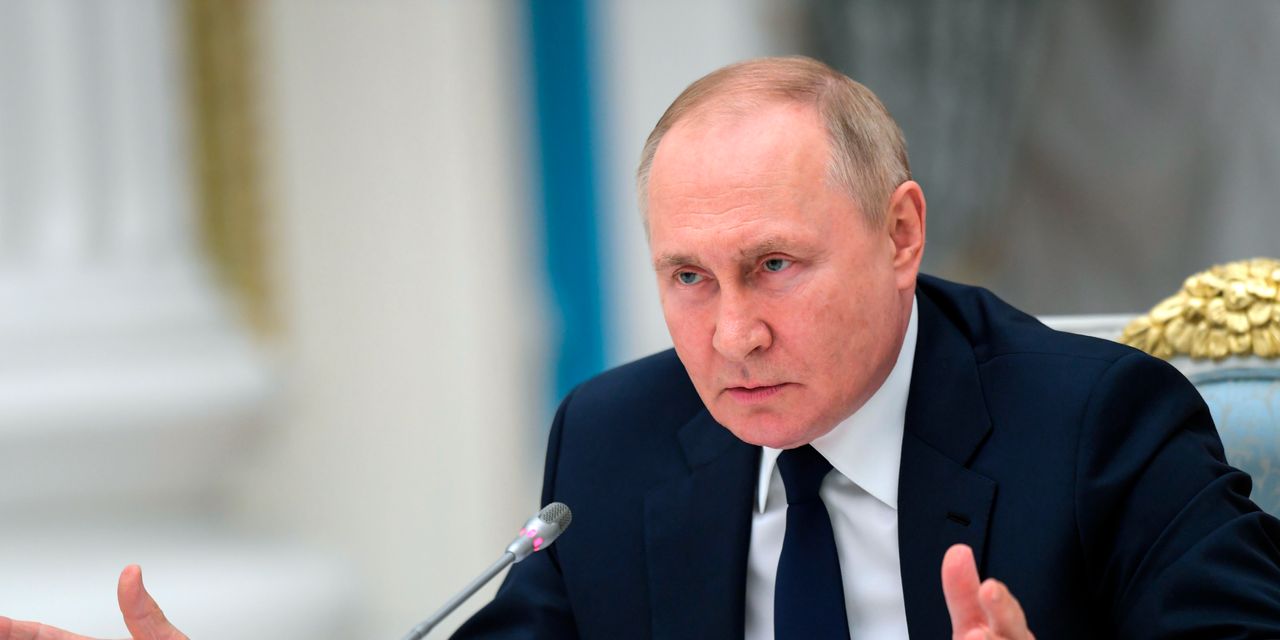Vladimir Putin’s escalation of Russia’s war in Ukraine and another round of nuclear saber-rattling didn’t knock Federal Reserve Chair Jerome Powell out of the market spotlight Wednesday. But investors might want to pay attention.
“The news from Russia dashed hope for an early wind-down of the Russo-Ukrainian War, or for a rebound” by the euro or the British pound, said Thierry Wizman, global FX and rates strategist at Macquarie, in a note.
“That’s not to say that Jay Powell’s Fed isn’t important, but rather to say that what the Fed does today could fade in importance within a few weeks if other events come to the fore — the War being the most prominent of the ‘known unknowns,” Wizman said, using a term popularized by former U.S. Defense Secretary Donald Rumsfeld.
Putin, reeling from a string of battlefield losses in Ukraine, on Wednesday ordered the partial mobilization of reservists in an escalation of the conflict. The Russian president also said Russia will use “all the instruments at its proposal to counter a threat against its territorial integrity — this is not a bluff.”
The remarks, accompanied by a plan to annex a large chunk of Ukraine territory, were perceived as a nuclear threat. Hours later, U.S. President Joe Biden blasted the military escalation and Putin’s remarks in an address to the U.N. General Assembly in New York.
“Just today, President Putin has made overt nuclear threats against Europe, in a reckless disregard for the responsibilities of the nonproliferation regime. Now, Russia is calling up more soldiers to join the fight, and the Kremlin is organizing sham referenda to try to annex parts of Ukraine — an extremely significant violation of the U.N. charter,” Biden said.
Putin’s remarks caused a knee-jerk reaction in markets, with oil, grain and European natural-gas futures jumping. The U.S. dollar and Treasurys saw some haven-related buying, pushing down yields, but investors didn’t shy away from risky assets, with U.S. stocks posting modest gains as attention remained largely focused on an afternoon Federal Reserve decision expected to deliver another 75 basis point, or 0.75 percentage point, rise in the fed-funds rate and clues to the scope of further rate increases.
See: 4 things to watch when the Fed delivers its interest-rate-hike decision
The Dow Jones Industrial Average
DJIA,
was up 103 points, or 0.3%, while the S&P 500
SPX,
gained 0.5%. Oil futures gave up early gains, with the U.S. benchmark
CL.1,
down 0.4% near $83.56 a barrel, while November Brent crude
BRN00,
BRNX22,
the global benchmark, edged down 0.2% to trade near $90.40 a barrel.
“The most depressing aspect of this verbal escalation is that truce talks — which seemed to have a flicker of life yesterday — now seem doubtful any time soon, which means a war throughout the winter is more likely, with all that implies for energy shortages in Western Europe,” said Greg Valliere, chief U.S. policy strategist at AGF Investments, in a note.
Read: Putin’s partial draft announcement appears to spark scramble to leave Russia as flights fill up
The calling up of potentially 300,000 reservists would mark the largest Russian mobilization of troops since World War II “and all but ensures that there will be no near-term off-ramp for the military conflict, which has already left thousands dead and is imposing ruinous economic costs on Europe,” said Helima Croft, head of global commodity strategy at RBC Capital Markets, in a note.
The move underlines jitters among administration officials that Russia’s setbacks in Ukraine could lead an increasingly desperate Putin to pursue an increasingly dangerous escalation of the conflict, Croft said.
Many market participants, in contrast, had seemed eager to “fade” the war story and look past the coming winter energy crunch in Europe, Croft said.
“Some have suggested that Putin may have already played most of his cards by cutting off gas supplies to Europe and that his economic weaponization strategy will yield diminishing returns on a go-forward basis given the relatively robust gas storage levels and the success of countries like Germany in building out LNG infrastructure,” Croft said.
She argued that instead things were likely to get worse, potentially creating a “multi-winter emergency”.
“At a minimum, we think that if he is willing to order a potentially unpopular troop mobilization, he would not shy away from curtailing oil exports to Europe in advance of the Dec. 5 EU sanctions start date,” Croft said.
Important questions surround the Western response.
“The United States and its allies continue to contend that the catalyst for a formal military intervention would be a Russian attack on a NATO country. To date, there has been no definitive statement on whether a tactical nuclear strike or a nuclear contamination emergency caused by the deliberate shelling of a facility, such as the Zaporizhzhia reactor, would be a red line that would prompt a Western military response,” Croft wrote.
